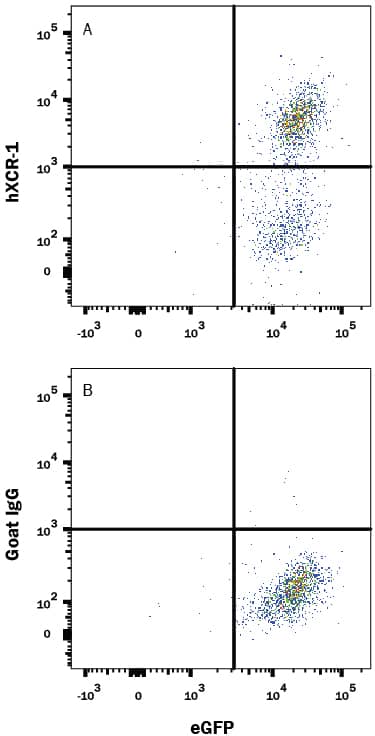Human XCR1 Antibody
R&D Systems, part of Bio-Techne | Catalog # AF857


Key Product Details
Validated by
Species Reactivity
Applications
Label
Antibody Source
Product Specifications
Immunogen
Met1-Thr31, Ser89-Lys103, His168-His190, Phe251-Tyr267
Accession # P46094
Specificity
Clonality
Host
Isotype
Scientific Data Images for Human XCR1 Antibody
Detection of XCR1 in Human Monocytes by Flow Cytometry.
Human peripheral blood monocytes were treated for 16 hours with 1 µg/mL LPS then stained with Goat Anti-Human XCR1 Antigen Affinity-purified Polyclonal Antibody (Catalog # AF857, filled histogram) or isotype control antibody (Catalog # AB-108-C, open histogram), followed by Phycoerythrin-conjugated Anti-Goat IgG Secondary Antibody (Catalog # F0107).Detection of XCR1 in NS0 Mouse Cell Line Transfected with Human XCR-1 and eGFP by Flow Cytometry.
NS0 mouse myeloma cell line transfected with human XCR-1 and eGFP was stained with and either (A) Goat Anti-Human XCR1 Antigen Affinity-purified Polyclonal Antibody (Catalog # AF857) or (B) Normal Goat IgG Control (Catalog # AB-108-C) followed by Allophycocyanin-conjugated Anti-Goat IgG Secondary Antibody (Catalog # F0108). View our protocol for Staining Membrane-associated Proteins.Applications for Human XCR1 Antibody
CyTOF-ready
Flow Cytometry
Sample: Human peripheral blood monocytes treated with LPS and NS0 mouse myeloma cell line transfected with human XCR-1 and eGFP
Immunocytochemistry
Sample: Immersion fixed human peripheral blood mononuclear cells
Western Blot
Sample: Recombinant Human XCR1
Formulation, Preparation, and Storage
Purification
Reconstitution
Formulation
Shipping
Stability & Storage
- 12 months from date of receipt, -20 to -70 °C as supplied.
- 1 month, 2 to 8 °C under sterile conditions after reconstitution.
- 6 months, -20 to -70 °C under sterile conditions after reconstitution.
Background: XCR1
XCR1, also known as GPR5 and lymphotactin/SCM-1 (single cysteine motif 1) receptor, is a 38 kDa member of the G-protein coupled receptor 1 family. It binds XCL1/lymphotactin/SCM-1 alpha and XCL2/SCM-1 beta. In addition, human herpesvirus 8 (HHV8) encodes two viral chemokines vCCL2/vMIP-II and vCCL3/vMIP-III that function as an antagonist and a highly selective agonist, respectively, for XCR1. XCR1 is expressed on neutrophils, CD8+ T cells , NK cells, CD4+ T cells and B cells. Human XCR1 is a 333 amino acid (aa), 7-transmembrane molecule. It contains a 32 aa N-terminus that lacks glycosylation sites and a 42 aa C-terminal cytoplasmic tail. Over the extracellular regions used for immunization, human XCR1 shares 62%, 54% and 64% aa identity with canine, mouse and porcine XCR1, respectively.
Long Name
Alternate Names
Gene Symbol
UniProt
Additional XCR1 Products
Product Documents for Human XCR1 Antibody
Product Specific Notices for Human XCR1 Antibody
For research use only
